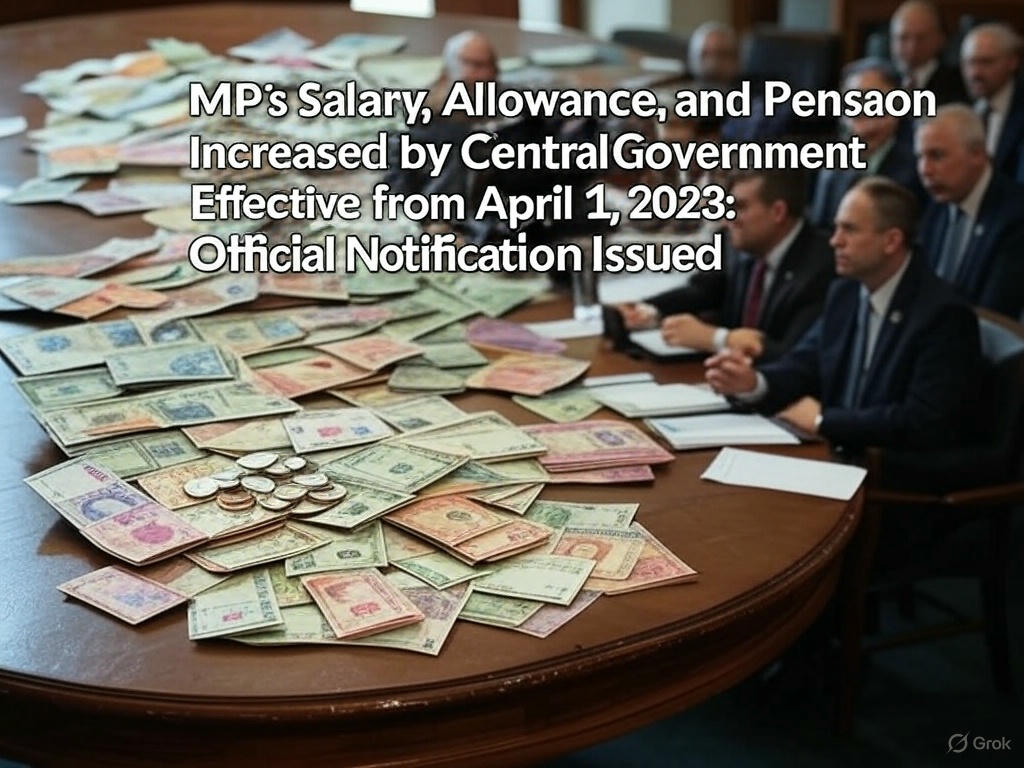The central government has announced a significant increase in the salary, allowances, and pension of Members of Parliament (MPs), effective April 1, 2023. The decision, as per the official notification, aims to adjust lawmakers’ remuneration in accordance with increasing inflation and the rising financial demands of public service. The development has triggered different reactions from the political sphere, economists, and the public in general.
The Major Highlights of the Hike in Salary and Allowance
The revision of the MPs’ salaries and benefits includes the following major components:
- Basic Salary: The monthly salary of MPs has been raised significantly, providing them with greater financial security.
- Constituency Allowance: This allowance, meant to cover expenses incurred while serving their constituencies, has been increased to ensure that MPs can effectively engage with their electorate.
- Office and Staff Allowance: MPs receive enhanced financial assistance to maintain offices and pay staff.
- Daily and Travel Allowance: Lawmakers receive a daily allowance when the Parliament is in session, besides the reimbursement of their travel expenses. Both these allowances have been increased considerably.
- Pension Benefits: Former MPs will benefit from increased pension, which ensures financial stability subsequent to their retirement.
The Parliament is empowered under Article 106 of the Constitution of India to determine the salaries and allowances of its members. As it is not possible for the Parliament to make laws for every update, it passed the 1954 Act, which delegated such power to the executive branch (The Central Government) to give notice of such changes.
Under sub-section (2) of section 3 and sub-section (1A) of section 8A of the Salary, Allowances and Pension of Members of Parliament Act, 1954 (30 of 1954), the Central Government notified the increase in the salary, daily allowances, pension and additional pension of the Members and Ex-Members of Parliament. The increase will come into effect retrospectively.
Government’s Justification for the Hike
According to government officials, the salary revision was necessitated by multiple factors:
- Inflation and Cost of Living: Increasing costs have made it necessary to adjust salaries to ensure that MPs can perform their duties without financial constraints.
- Parliamentary Responsibilities: MPs are required to travel widely, work together with their constituents, and contribute to governance, activities which involve significant expenses.
- Comparative Adjustments: The remuneration of MPs in India had fallen behind that of legislators in other countries, which makes an update necessary.
Public and Political Reactions
The announcement has elicited mixed reactions from various quarters:
- Support from Political Leaders: Several MPs and government officials have welcomed the move, stating that it will help lawmakers focus better on governance.
- Criticism from Public and Activists: Many citizens and social activists have criticized the hike, arguing that increasing the MPs’ salaries while common citizens struggle with inflation is unfair.
- Opposition Party Stance: Some opposition parties have questioned the timing of the hike, suggesting that the government should prioritize public welfare over financial benefits for lawmakers.
Comparison with Other Countries
While the increase in salary has been a matter of controversy, a global comparison indicates that the remuneration of Indian MPs remains lower than that of lawmakers in countries such as the US and the UK. However, critics argue that India’s per capita income is so much lower that the focus should be on developmental policies rather than on increasing the salaries of MPs.
Conclusion
The hike in the MPs’ salaries, allowances, and pensions has stirred a debate about governance, fiscal responsibility, and ethical leadership. While it is essential to compensate lawmakers fairly, public sentiment suggests the need for greater transparency and accountability in such decisions. The government must ensure that economic policies benefit all sections of society, not just elected representatives. Such policies should not only in letter but also in spirit and truth be beneficial to the masses, which otherwise makes them feel left out of the development of the country.

Ananda Murthy JS is an English teacher in Hyderabad. His teaching experience spans more than 30 years, which includes his stint as an IGCSE teacher in the Maldives, lecturer in English for Intermediate students, writer and editor/language specialist, and IELTS, GRE and TOEFL trainer. He also provides English coaching to students appearing for CAT, IELTS, GRE and TOEFL privately in Hyderabad. Ananda has proficiency in editing SWOT analyses, market forecast and other reports, conducting Effective English sessions, and imparting training in Business English. He also write business blogs, key word dense articles and original articles on various topics.

